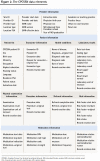Ethics and privacy issues of a practice-based surveillance system: need for a national-level institutional research ethics board and consent standards
- PMID: 21998237
- PMCID: PMC3192088
Ethics and privacy issues of a practice-based surveillance system: need for a national-level institutional research ethics board and consent standards
Abstract
Objective: To describe the challenges the Canadian Primary Care Sentinel Surveillance Network (CPCSSN) experienced with institutional research ethics boards (IREBs) when seeking approvals across jurisdictions and to provide recommendations for overcoming challenges of ethical review for multisite and multijurisdictional surveillance and research.
Background: The CPCSSN project collects and validates longitudinal primary care health information (relating to hypertension, diabetes, depression, chronic obstructive lung disease, and osteoarthritis) from electronic medical records across Canada. Privacy and data storage security policies and processes have been developed to protect participants' privacy and confidentiality, and IREB approval is obtained in each participating jurisdiction. Inconsistent interpretation and application of privacy and ethical issues by IREBs delays and impedes research programs that could better inform us about chronic disease.
Results: The CPCSSN project's experience with gaining approval from IREBs highlights the difficulty of conducting pan-Canadian health surveillance and multicentre research. Inconsistent IREB approvals to waive explicit individual informed consent produced particular challenges for researchers.
Conclusion: The CPCSSN experience highlights the need to develop a better process for researchers to obtain timely and consistent IREB approvals for multicentre surveillance and research. We suggest developing a specialized, national, centralized IREB responsible for approving multisite studies related to population health research.
Objectif: Décrire les difficultés rencontrées par le Réseau canadien de surveillance sentinelle en soins primaires (RCSSSP) face aux bureaux institutionnels d’éthique en recherche (BIÉR) lors des demandes d’approbation aux diverses instances, et formuler des recommandations pour répondre aux défis que présente l’examen éthique dans les cas de surveillance et d’études multicentriques relevant de plusieurs juridictions.
Contexte: Le projet du RCSSSP recueille et valide des données longitudinales sur les soins de santé primaires (concernant l’hypertension, le diabète, la dépression, la maladie pulmonaire obstructive chronique et l’arthrose) à partir de dossiers médicaux électroniques d’un peu partout au Canada. On a élaboré des politiques et des processus relatifs à la protection de la confidentialité et au stockage sécuritaire des données afin de protéger la vie privée et la confidentialité des participants, tandis que l’approbation des BIÉR relève de chaque juridiction participante. Des différences entre les BIÉR quant à l’interprétation et l’application des questions de confidentialité et d’éthique retardent et gênent des programme de recherche qui pourraient mieux nous renseigner sur les maladies chroniques.
Résultats: Ce que le projet RCSSSP a constaté relativement à l’approbation des BIÉR illustre bien la difficulté d’effectuer une surveillance pan-canadienne de la santé et des recherches multicentriques. Des contradictions entre BIÉR dans les décisions concernant le fait de ne pas exiger des consentements éclairés individuels explicites ont occasionné des problèmes importants aux chercheurs.
Conclusion: L’expérience du RCSSSP fait bien voir la nécessité de mettre au point un processus plus adéquat permettant aux chercheurs d’obtenir de façon moins variable et en temps opportun des approbations pour des études de surveillance et de recherche multicentriques. Les auteurs suggèrent de créer un BIÉR national centralisé et spécialisé ayant la responsabilité d’approuver les études multicentriques sur la santé de la population.
Figures


Comment in
-
Ask not what your REB can do for you; ask what you can do for your REB.Can Fam Physician. 2011 Oct;57(10):1113-4. Can Fam Physician. 2011. PMID: 21998218 Free PMC article. No abstract available.
-
Respect for the subject paramount.Can Fam Physician. 2012 Feb;58(2):153-5; author reply 155-6. Can Fam Physician. 2012. PMID: 22337737 Free PMC article. No abstract available.
References
-
- Birtwhistle R, Keshavjee K, Lambert-Lanning A, Godwin M, Greiver M, Manca D, et al. Building a pan-Canadian primary care sentinel surveillance network: initial development and moving forward. J Am Board Fam Med. 2009;22(4):412–22. - PubMed
-
- Canadian Institutes of Health Research, Natural Sciences and Engineering Research Council of Canada, Social Sciences and Humanities Research Council of Canada . Tri-Council Policy Statement: ethical conduct for research involving humans. Ottawa, ON: Canadian Institutes of Health Research, Natural Sciences and Engineering Research Council of Canada, Social Sciences and Humanities Research Council of Canada; 1998.
-
- International Conference on Harmonisation . International Conference on Harmonisation of technical requirements for registration of pharmaceuticals for human use. ICH harmonised tripartite guideline. Guideline for good clinical practice E6(R1) Geneva, Switz: International Conference on Harmonisation; 1996. Available from: www.ich.org/fileadmin/Public_Web_Site/ICH_Products/Guidelines/Efficacy/E.... Accessed 2011 Aug 12.
-
- Government of Saskatchewan [website] Health Information Protection Act (HIPA) Regina, SK: Government of Saskatchewan; 2011. Available from: www.health.gov.sk.ca/health-information-protection-act. Accessed 2011 Aug 12.
-
- Centres de santé et de services sociaux du Quebec [website] Loi sur les services de santé et les services sociaux. Quebec, QC: Government of Quebec; 2011. Available from: www2.publicationsduquebec.gouv.qc.ca/dynamicSearch/telecharge.php?type=2.... Accessed 2011 Sep 6.
Publication types
MeSH terms
LinkOut - more resources
Full Text Sources
